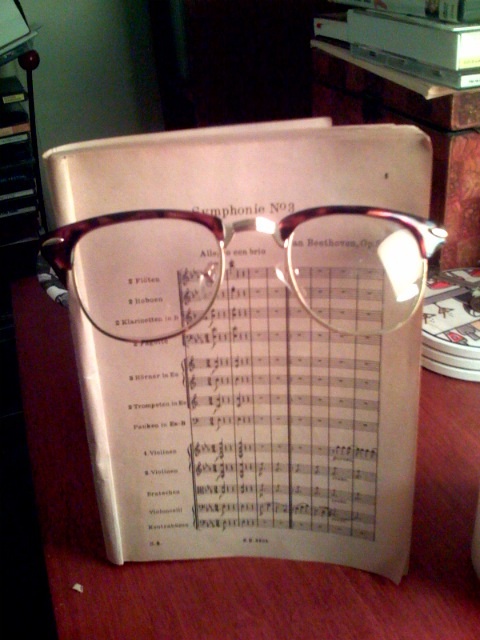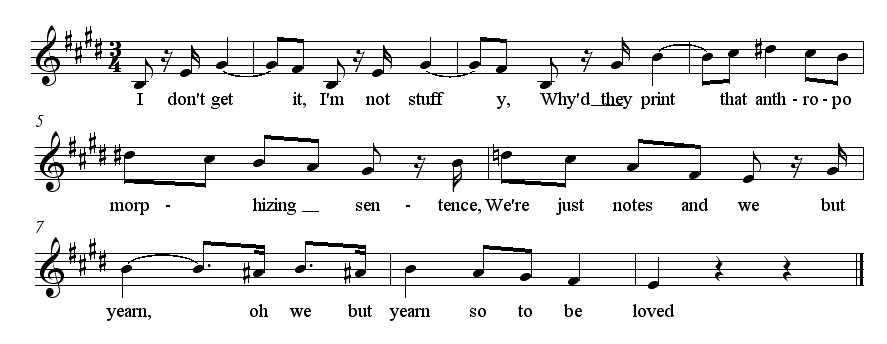I’m sorry, I tried to restrain myself from this post, but it was not possible. I was just meandering around the internet, minding my own business, innocently, when I ran–smack! whap!–into this beginning of a review:
[AMERICAN CITY] — Classical music has grown increasingly serious over the years, as it seeks to counter charges of its own irrelevance with claims of its moral or artistic superiority. As a result, its works are becoming ever more monumental. [etc. etc.]
I felt a journalistic need to confirm these assertions. I looked up “Music, Classical” in the Yellow Pages, but it wasn’t there; it was in the White Pages.  When it/they picked up the phone, Classical Music sounded none too serious. I spoke first with “Eroica” Symphony, the 3rd, a major spokesperson; but immediately, his brother “Pathetique” Symphony, VI, got on the line too, brusquely and mincingly at the same time, if that were possible. “We totally aren’t that monumental, dude,” they said, while apparently downing shots of tequila and trying on silly noses. “OK, we are morally superior, that goes without saying, but that’s cause we don’t sleep around like rock’n’roll, we have, like, values. It has nothing to do with irrelevance.” But their agreement only went so far: one concluded on a sunny E-flat major chord, while the other, ominously, on b minor. The conversation was therefore mildly cacophonous; as a journalist, again, I wondered: which one is giving us the real scoop? The closing theme of the first movement of the Brahms A major Piano Quartet phoned me later, to add, with a bit of Viennese lilt:
When it/they picked up the phone, Classical Music sounded none too serious. I spoke first with “Eroica” Symphony, the 3rd, a major spokesperson; but immediately, his brother “Pathetique” Symphony, VI, got on the line too, brusquely and mincingly at the same time, if that were possible. “We totally aren’t that monumental, dude,” they said, while apparently downing shots of tequila and trying on silly noses. “OK, we are morally superior, that goes without saying, but that’s cause we don’t sleep around like rock’n’roll, we have, like, values. It has nothing to do with irrelevance.” But their agreement only went so far: one concluded on a sunny E-flat major chord, while the other, ominously, on b minor. The conversation was therefore mildly cacophonous; as a journalist, again, I wondered: which one is giving us the real scoop? The closing theme of the first movement of the Brahms A major Piano Quartet phoned me later, to add, with a bit of Viennese lilt:

“It’s true,” said the midpoint of Berg’s Chamber Concerto, in a subsequent follow-up meeting, “some of us get a little stuck up sometimes; some of us are a little aloof,” gesturing vaguely towards the Boulez 2nd Sonata, which in turn was making rabbit ears behind the Chamber Concerto’s head, “but you know we’re just pieces, we’re none of us perfect, can’t we just get along?” As to the charge of monumentality, a panel was convened, comprised of Josquin, the tenor voice of his Missa Pange Lingua, the Evangelist from the St. Matthew Passion, the ghost of Jascha Heifetz, the upper manual of a 1735 harpsichord, a Tristan chord, and a Schenkerian 3-line. Plied with nachos and beer, this group soon agreed that they were all in danger of getting fat, and expressed a desire to get back to the gym.



10 Comments
Nachos and Beer and Music… Who could ask for anything more?
anything you can drink and nosh to sounds good to me.
Yeah I wonder about this sort of thing as well. Not like it keeps me up at night, but close to it. If classical music is so elevated, so ennobling, then those practicing it should be the most elevated and ennobled people around, right?
I’m not trying to hijack the direction your blog takes, but I am very curious to know what your reactions would be to these two articles:
Richard Taruskin slamming those who “elevate” classical music
http://www.tnr.com/politics/story.html?id=f3839c75-3724-4154-adc4-e0638e30448a&p=1
Stanley Fish, a little less vituperatively, on the humanities in general:
http://fish.blogs.nytimes.com/2008/01/06/will-the-humanities-save-us/?scp=3&sq=justify+humanities
Yours,
Nacho lover
I have to admire their ability to speak at length and yet completely avoid answering the question. You can tell Classical Music’s been around and isn’t going to fall for the usual journalistic tricks. They’ve seen it all!
I attended a summer camp with the Berg Chamber Concerto and the Bolez Second Sonata. I shared a cabin with the Berg, but only knew the Boulez by listening. One of the boys in my cabin developed an allergy to the Berg–gave him migraines. It’s nice to hear they are doing well.
I attended a summer camp with the Berg Chamber Concerto and the Boulez Second Sonata. I shared a cabin with the Berg, but only knew the Boulez by listening. One of the boys in my cabin developed an allergy to the Berg–gave him migraines. It’s nice to hear they are doing well.
Don’t know why Ms M’s name has been suppressed but Classical Music should not be intimidated into by her “pulse taking” into going to the gym. [Can you inaging Brahms in lycra?]
The only suitable aerobics are hiking, mountain climbing, hunting, laughing and of course vigorous sexual intercourse.
Genius! A composition a such wit and complexity it deserves its own listing in the white pages…thank you for the excellent laugh.
Brilliant, except I don’t think the ghost of Jascha Heifetz is in danger of getting fat.
Music is an evolution and it will evolve to whatever the contemporary artists do to it. Classical music is no different and it will change, culture wise and with its musicality. However it is referenced it will have a place in someone’s heart and be passionate about it.
One Trackback
[…] been reading Jeremy Denk’s blog for quite a while, and love it. His recent post in response to a Washington Post article claiming classical music is becoming more and more serious […]